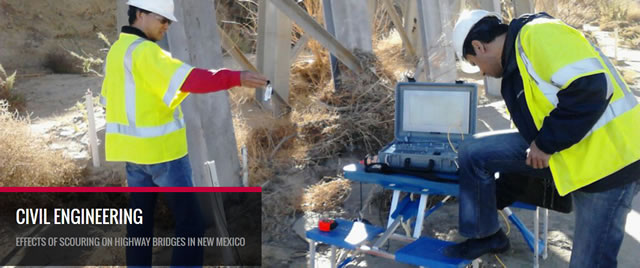
Civil Engineering ETDs
Publication Date
Spring 5-2024
Abstract
Meteorological, hydrological, and biogeochemical processes naturally control stream ecosystems. These processes define the frequency and distribution of precipitation and the supply and demand of solutes and particles to support aquatic food chains through space and time. Studies have also found that stream ecosystems are also controlled by anthropogenic activities, which occur on a much shorter timescale. These anthropogenic activities affect stream ecosystems' structure and function from local to planetary changes to the environment. It is essential for scientists and engineers to understand the relationships between naturally occurring processes and those created by human activities for a better interpretation of stream ecosystem variables.
While there has been a substantial body of work linking these processes, there are gaps in the existing literature arising from logistical constraints to physical, biological, and chemical processes associated with the functioning of stream ecosystems. To help bridge these gaps, stream nutrient experiments were conducted across sites with varying land use and sizes and stream chemistry and biology to better understand the relevance and co-dependences between these processes. First, we conducted a suit of mesocosm stream nutrient experiments across a fluvial network spanning about 1.5 square kilometers through a 1st to 7th-order stream. Next, we conducted replicated nutrient experiments (similar to those in the fluvial network) across a forested pool and riffle stream in Colorado, USA, and a low gradient agricultural stream in Iowa, USA. Each of our experiments involved the manipulation of key nutrients such as nitrogen, carbon, and phosphorus with the goal of understanding how the supply and demand of resources affect ecosystem functioning. Results from our experiments showed vast differences between our study reach and across nutrient manipulations. More importantly, we found that the distribution supply and demand of solutes and particles to support aquatic food chains is important in regulating stream ecosystem health and functioning.
Keywords
ecosystem respiration, stoichiometry, nutrient, ecosystems, nutrient uptake
Document Type
Dissertation
Language
English
Degree Name
Civil Engineering
Level of Degree
Doctoral
Department Name
Civil Engineering
First Committee Member (Chair)
Dr. Ricardo González-Pinzón
Second Committee Member
Dr. David Van Horn
Third Committee Member
Dr. Timothy Covino
Fourth Committee Member
Dr. Mark Stone
Recommended Citation
Dorley, Jancoba K.. "PHYSICAL AND STOCHIOMETRIC CONTROLS ON NUTRIENT UPTAKE AND ECOSYSTEM RESPIRATION IN CONTRASTING SITES." (2024). https://digitalrepository.unm.edu/ce_etds/298
